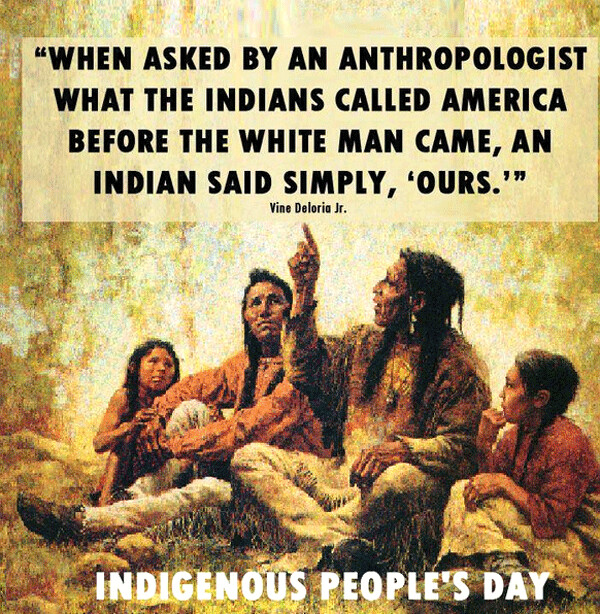News & Articles
Browse all content by date.

Indigenous Peoples Day is increasingly being celebrated across the U.S. in place of Christopher Columbus Day, as the myth of Columbus as beneficent discoverer is debunked and as the critical role of indigenous people in protecting the planet becomes more recognized. Indigenous defenders of Mother Earth are often at the front lines of environmental destruction, confronting militarized state and corporate power against enormous odds, with courage and determination. Columbus arrived in the Bahamas 527 years ago, unleashing a brutal genocide that killed tens of millions of native people across the hemisphere. Now, as the sixth great extinction accelerates and the planet catastrophically heats up, it may well be indigenous peoples who save us all.
Official recognition of Indigenous Peoples Day has occurred in at least eight states: Alaska, Maine, Minnesota, New Mexico, North Carolina, South Dakota, Vermont and Wisconsin. Over 130 cities and counties have adopted the holiday as well, from big cities like Los Angeles, San Francisco, and Dallas, to smaller places like Livingston, Kentucky, and Harpers Ferry, West Virginia.
Washington, D.C., the District of Columbia, the name of which derives from Columbus, just passed a resolution recognizing Indigenous Peoples Day. "Columbus Day was officially designated as a federal holiday in 1937 despite the fact that Columbus did not discover North America, despite the fact that millions of people were already living in North America upon his arrival in the Americas, and despite the fact that Columbus never set foot on the shores of the current United States," D.C. Councilmember at-large David Grosso said in a statement before the vote. "Columbus enslaved, colonized, mutilated and massacred thousands of Indigenous People in the Americas."
The movement to replace Columbus Day gained momentum in 1992, the 500th anniversary of Columbus' arrival, with Berkeley, California, becoming the first city to make the change. Earlier protests inspired the movement, including the annual National Day of Mourning in Plymouth, Massachusetts, held on Thanksgiving to challenge the myth of peaceful coexistence between native people and the English settlers, the Pilgrims. UnThanksgiving is an annual event in San Francisco, where hundreds travel by boat to Alcatraz Island, once the site of a notorious prison, for a sunrise ceremony. Native American activists occupied the island 50 years ago to protest the plight of indigenous peoples in the United States.
Across the Americas, indigenous communities are standing up against unrestrained exploitation of their land, extractive industries, violence and racism. In Ecuador, indigenous-led protests against International Monetary Fund-imposed austerity measures, as well as against ongoing oil extraction and mining, have forced President Lenin Moreno to relocate his government from Quito to the city of Guayaquil.
Ecuadorian law professor David Cordero Heredia described the role of indigenous activism on the "Democracy Now!" news hour: "Indigenous people are offering us a sustainable alternative. They want to protect their jungles, their territories. They've got another way to see the world."
Indigenous tribes in the Amazon in Brazil are confronting racist government policies as well as the life-threatening forest fires largely set on purpose with the blessings of President Jair Bolsonaro. The indigenous rights group Survival International said the president "wants to open up indigenous territories across Brazil to loggers, miners and ranchers. He doesn't care how many indigenous people die in the process, and has openly expressed his racist contempt for them on many occasions."
As she makes her way across North America, 16-year-old Swedish climate activist Greta Thunberg spent this week visiting indigenous youth activists in the Dakotas, on the Pine Ridge Reservation and on the Standing Rock Sioux Reservation, where hundreds of tribes gathered in 2016-17 to oppose the Dakota Access Pipeline. In his first days in office, President Donald Trump greenlighted both the Dakota Access Pipeline and the Keystone XL pipeline.
In a video produced by the Lakota People's Law Project urging Congress to stop the Keystone XL pipeline, Tokata Iron Eyes, also 16 years old, standing next to Greta, said: "Indigenous peoples have been on the front lines of the climate crisis, and we know how to live in balance with the Earth. When we're talking about solutions, we have to include indigenous peoples in the conversation. Let's protect our indigenous peoples, their rights, their communities, their way of life, because that's what we're going to need when we go into this battle."
Columbus was a native of Genoa, Italy. But the movement to rename Columbus Day is not a slight against the Italian American community. It is a denunciation of genocide, and a celebration of indigenous peoples and their central role in our history and in our future.
(c) 2019 Amy Goodman and Denis Moynihan Distributed by King Features Syndicate
| Tweet |


